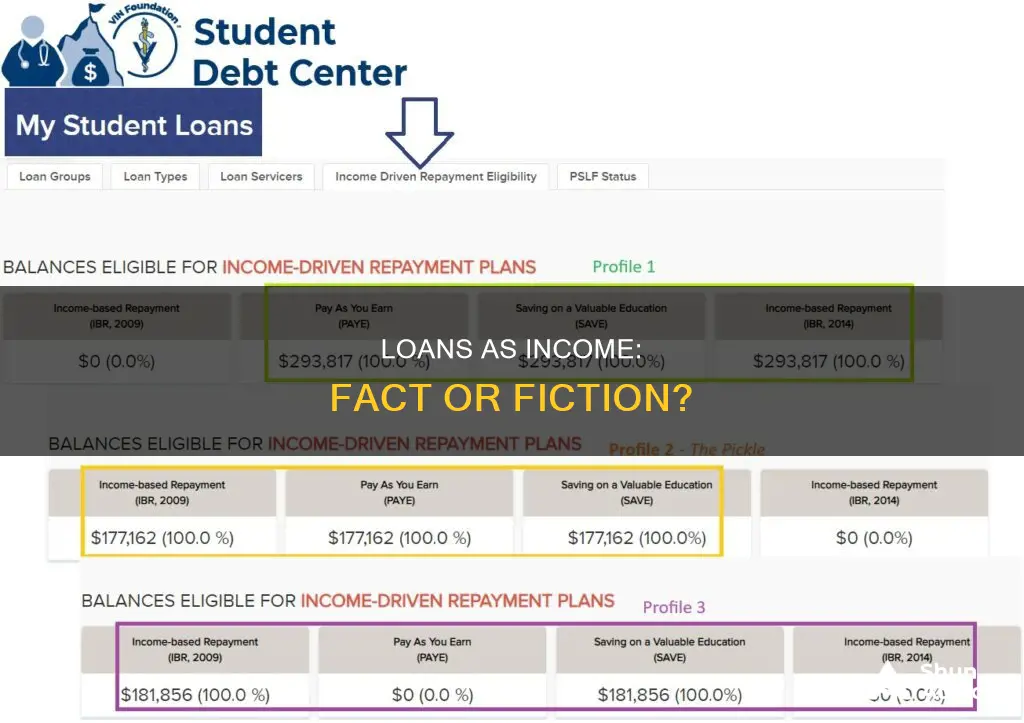
Taking out a loan usually doesn't count as income, but there are some exceptions. Personal loans are generally not considered taxable income because they are a form of debt that must be repaid. However, if a loan is forgiven or cancelled, it may be considered income and could be subject to taxes. The rules for loans from friends and family are slightly different and may have tax implications for the lender if they don't charge interest or charge below-market rates. In such cases, the IRS may consider the loan a gift, and there could be gift tax implications.
| Characteristics | Values |
|---|---|
| Personal loans as taxable income | No, unless the loan is forgiven |
| Personal loans from financial institutions | Not taxable |
| Personal loans from friends or family | Not taxable, but may have tax implications for the lender |
| Loans with no interest or below-market interest rates | May be considered a gift by the IRS |
| Gifts | May be subject to gift tax |
| Student loans | Not taxable income for the borrower, but interest income is taxable for the lender |
| Debt cancellation | May be taxable income |
| Debt discharged during bankruptcy | Not taxable income |
| Insolvency | May exclude debt from gross income |
What You'll Learn

Personal loans are not taxable income
However, there is one significant exception to this rule: if a lender cancels or forgives part or all of a borrower's personal loan debt, then the cancelled portion is considered taxable income. This is known as "cancellation of debt income" (COD income). If you receive a 1099-C tax form, it means that more than $600 of your personal loan debt has been cancelled, and you will need to pay taxes on the cancelled amount.
It is important to note that there are some exceptions to the COD income rule. For example, if the debt cancellation was part of a bankruptcy, it would not count toward your gross income. Additionally, if the loan was forgiven as a gift by a private lender, you do not need to report it as income. In the case of loans from friends or family members, the money typically won't count as taxable income for the borrower, but there could be tax implications for the lender if they do not charge interest or charge a below-market rate.
While personal loans themselves are not taxable income, the interest on personal loan funds used for business purposes may be deductible. Understanding how a personal loan affects your taxes can help you file an accurate return and take advantage of any applicable deductions.
Summer Loans: Rollover Options and What You Need to Know
You may want to see also

Forgiven or cancelled debt is considered income
Generally, personal loans are not considered taxable income because the money received is not income. Unlike wages or investment earnings, which you keep, you need to repay what you borrow. However, there are a few exceptions. For instance, if a loan is forgiven as a gift, it may chip away at the lifetime exemption from the gift tax. Debt discharged during bankruptcy is also excluded from gross income.
When a lender cancels or forgives a debt, it is generally considered income. The lender is usually required to report the amount of the cancelled debt to the borrower and the IRS on a Form 1099-C, Cancellation of Debt. The borrower must then include the cancelled amount in their income for tax purposes. The IRS considers nearly any debt that is cancelled, forgiven, or discharged as taxable income.
There are, however, several exceptions to the taxability of cancelled debt. For example, if a loan is forgiven as a gift, bequest, devise, or inheritance, it is not considered taxable income. Certain qualified student loans containing loan provisions for cancellation based on length of employment in certain professions are also excluded. Additionally, if the borrower is insolvent (their liabilities exceed their assets), the forgiven debt may be excluded from their gross income.
Furthermore, the Mortgage Forgiveness Debt Relief Act allows taxpayers to exclude up to $2 million in forgiven mortgage debt from their incomes if they were married and filing jointly, or up to $1 million for other filing statuses. This act was applied from 2007 through 2020 and covered debt reduction through restructuring and foreclosure. From 2021 to 2025, the maximum amount of excluded forgiven debt is limited to $750,000.
Weekend Loan Approvals: Sofi's Lending Availability
You may want to see also

Loans from friends and family may have tax implications
Generally, personal loans are not considered taxable income because the money received must be repaid. However, loans from friends and family may have different tax implications depending on the jurisdiction and specific circumstances. Here are some key points to consider:
Tax Implications for the Borrower
In most cases, borrowers who take out loans from friends or family members do not need to include the loan amount as taxable income on their personal tax returns. This means that, typically, there are no tax implications for the borrower. However, if the loan is used for a home purchase, the borrower may be able to deduct the interest portion of the payments under the Home Mortgage Interest Deduction rules. It is important to note that this deduction is only relevant if the borrower itemizes deductions, which is not common.
Tax Implications for the Lender
When lending money to friends or family members, the tax implications can vary. If the lender charges interest, they are typically required to pay tax on the interest income earned from the loan. This is considered taxable income that must be reported when filing taxes. However, if the lender does not charge interest or charges an interest rate below the applicable federal rates (AFRs) set by the IRS, it may be considered a gift, and there could be gift tax implications. In the United States, for example, the gift tax exclusion amount for 2024 is $18,000 per individual. If the loan amount exceeds this threshold, the lender may need to file a gift tax form.
Documentation and Legal Considerations
It is strongly recommended to put loan details in writing, even for loans between friends and family. A basic contract or written agreement can help ensure that both parties understand the terms and potential tax implications. Seeking legal advice and consulting a financial advisor can be beneficial to ensure compliance with tax laws and to minimize potential tax liabilities.
International Considerations
When dealing with international loans, the tax implications can become more complex. For example, in India, there are specific restrictions and tax rates that apply to loans between residents and Non-resident Indians (NRIs). It is important to be aware of the relevant tax laws and regulations in your jurisdiction when considering loans from friends or family members.
Secu Loans for RVs: What You Need to Know
You may want to see also

Student loans can be tax-deductible
Generally, loans are not considered income and therefore are not taxed. This is because, unlike wages or investment earnings, loans are not kept by the borrower and must be repaid. However, there are some exceptions to this rule. For example, if a loan is forgiven as a gift, it may chip away at the lifetime exemption from the gift tax. In the context of student loans, while they are not considered taxable income, settled student loan debt is typically taxable.
Furthermore, if you lend money to a family member, there may be tax implications depending on the amount loaned and the presence of interest charged. For example, if you lend your child $100,000 or less, and their net investment income is not more than $1,000 for the year, there may be no tax consequences. However, if you lend a significant amount of money (over $10,000) to your child, it is recommended that you charge interest to avoid gift tax implications.
Additionally, if your child does not pay back the loan, you may be able to take a bad debt deduction on your federal income tax return. To do so, you must provide evidence that the debt is worthless and that there is no chance of repayment, such as a written statement from your child stating their inability to pay.
ATV Loans: Sheffield Finance and Insurance Options
You may want to see also

Loans are a liability, not income
There are, however, some exceptions to this rule. For example, if a loan is forgiven as a gift, it may chip away at the lifetime exemption from the gift tax. In the case of a gift from a private lender, the borrower has no income to report. Additionally, debts discharged by bankruptcy are also excluded from gross income.
Loans from friends and family members are treated differently by the IRS. While the money you borrow from a friend or family member is not considered taxable income for you, there could be tax implications for the lender. If someone lends money without charging interest or charges a below-market rate compared to the IRS's current applicable federal rate, the IRS may consider the loan a gift or require them to pay income taxes on imputed interest.
It is important to note that the IRS has specific standards that informal lending arrangements must meet to avoid potential tax consequences. The IRS expects loans from relatives to resemble loans from a bank, with documented repayment and interest terms. If the repayment terms cannot be documented, the funds may be considered a gift, which must be declared by filing an IRS Form 709 if it exceeds the gift limit, which was $19,000 per recipient in 2025.
Stafford Loans: Summer Carryover Explained
You may want to see also
Frequently asked questions
No, a loan is not considered income because it is a form of debt that must be repaid. Even though you receive all the funds at once, it’s not considered income if you pay it back as agreed.
Yes, a loan is considered income if it is forgiven as a gift or during bankruptcy. In this case, the borrower will receive a 1099-C tax form.
Yes, there could be tax implications for the lender if they do not charge interest or charge a below-market rate compared to the IRS's current applicable federal rate. In this case, the IRS might consider the loan a gift or require them to pay income taxes on imputed interest.







